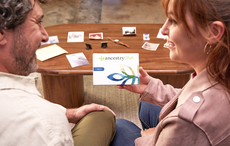- Culture Pop blog / "Extraordinary Measures" and my visit to the Crowley home | Click here
- The Crowley Family Story, Part One: The Diseases
- The Crowley Family Story, Part Two: Extraordinary Measures
- The Crowley Family Story, Part Three: The Family
- Brendan Fraser on playing the real John Crowley in 'Extraordinary Measures'
- Movie trailer / 'Extraordinary Measures' / Click here
The seeds of the movie Extraordinary Measures, in theaters January 22, were planted when Harrison Ford read the Wall Street Journal story about the Crowleys, took it to the producers of Erin Brockovich and said, “We should make a movie about this.”
“After Geeta Anand’s front page story came out, we heard from many different people from so many walks of life, and Geeta heard from a number of people about writing a book, and she asked if I would participate in that,” John recalls.
“So right around the time that we were getting ready to tell the story to potential publishers, Hollywood started calling,” John says. “It took us about six months or so to get comfortable with that concept, to sign your life rights away, to trust people to make a film and to do it the right way . . . to take that and actually make it an hour and forty minute major motion picture where you’ve got conflicts of business, science, and family issues … it was a Herculean challenge, and I think they did a terrific job,” says John, who has a cameo role in the movie.
The Crowleys were flown to Portland during production to visit the set, which allowed director Tom Vaughan and the actors to witness the family in action. “[Keri Russell, who plays Aileen in the film,] spent an afternoon just hanging out with the kids, getting to know them. She didn’t have to do that,” Aileen says. “They captured the spirit of the family, they captured the sense of urgency in building a business, they captured the enthusiasm and passion we all had, that entrepreneurial spirit to never, never quit,” says John.
“And [they captured] the frustration of drug development. One neat thing about the film is that there’s no bad guy, no bad person, no bad place. There are difficult situations and sometimes I, my character in the movie, acted well and sometimes he didn’t. The only person who is perfect throughout is Aileen and Keri [Russell] of course, but other than that, it’s just a bad situation. Really, the disease is the enemy.”
John, who is currently president and CEO of Amicus Therapeutics, a biopharmaceutical company focused on creating drugs to treat a range of genetic diseases, is optimistic about the future of American health care.
“First and foremost is the importance of constant innovation, risk-taking, and entrepreneurship. You think about what we were able to do with so many people along the way; that was really cutting-edge science. It was failing as much as succeeding. It was companies and private industry coming together; it was patients and parent groups, physicians, hospitals, government researchers, government regulatory agencies, philanthropic organizations. I don’t know if any of that would have happened, or as fast, if all of those pieces didn’t come together. And that is uniquely American.
"There’s nowhere else in the world you could get all those institutions, all those players, all those characters to come together and that is what makes America still the best healthcare system in the world. It is far from perfect and we can make it a lot better but I think we have to realize that we’re on the cusp of this golden age of medicine. In the next ten, twenty, thirty years we really can diagnose, treat and cure hundreds if not thousands of diseases that people live with every day. That to me is the most important lesson. Yes, we need to expand access to quality medicine to everybody. We need to control costs and manage costs more transparently, but also give patients and physicians the choice to have a consumer-driven healthcare model, and we don’t have that right now.
"How do you do all of that and continue to drive innovation and research and development and risk-taking? I’d love to see the entrepreneurial spirit in America unleashed to solve the healthcare problems that we have and make it a better system.”




Comments